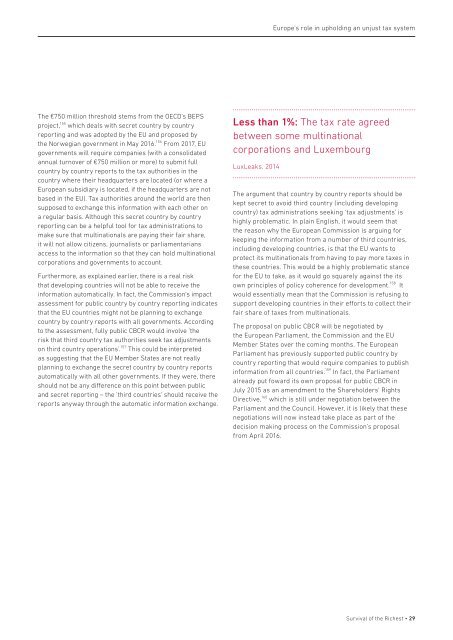Create successful ePaper yourself
Turn your PDF publications into a flip-book with our unique Google optimized e-Paper software.
Europe's role in upholding an unjust tax system<br />
The €750 million threshold stems from <strong>the</strong> OECD’s BEPS<br />
project, 155 which deals with secret country by country<br />
reporting and was adopted by <strong>the</strong> EU and proposed by<br />
<strong>the</strong> Norwegian government in May 2016. 156 From 2017, EU<br />
governments will require companies (with a consolidated<br />
annual turnover <strong>of</strong> €750 million or more) to submit full<br />
country by country reports to <strong>the</strong> tax authorities in <strong>the</strong><br />
country where <strong>the</strong>ir headquarters are located (or where a<br />
European subsidiary is located, if <strong>the</strong> headquarters are not<br />
based in <strong>the</strong> EU). Tax authorities around <strong>the</strong> world are <strong>the</strong>n<br />
supposed to exchange this information with each o<strong>the</strong>r on<br />
a regular basis. Although this secret country by country<br />
reporting can be a helpful tool for tax administrations to<br />
make sure that multinationals are paying <strong>the</strong>ir fair share,<br />
it will not allow citizens, journalists or parliamentarians<br />
access to <strong>the</strong> information so that <strong>the</strong>y can hold multinational<br />
corporations and governments to account.<br />
Fur<strong>the</strong>rmore, as explained earlier, <strong>the</strong>re is a real risk<br />
that developing countries will not be able to receive <strong>the</strong><br />
information automatically. In fact, <strong>the</strong> Commission’s impact<br />
assessment for public country by country reporting indicates<br />
that <strong>the</strong> EU countries might not be planning to exchange<br />
country by country reports with all governments. According<br />
to <strong>the</strong> assessment, fully public CBCR would involve ‘<strong>the</strong><br />
risk that third country tax authorities seek tax adjustments<br />
on third country operations’. 157 This could be interpreted<br />
as suggesting that <strong>the</strong> EU Member States are not really<br />
planning to exchange <strong>the</strong> secret country by country reports<br />
automatically with all o<strong>the</strong>r governments. If <strong>the</strong>y were, <strong>the</strong>re<br />
should not be any difference on this point between public<br />
and secret reporting – <strong>the</strong> ‘third countries’ should receive <strong>the</strong><br />
reports anyway through <strong>the</strong> automatic information exchange.<br />
Less than 1%: The tax rate agreed<br />
between some multinational<br />
corporations and Luxembourg<br />
LuxLeaks, 2014<br />
The argument that country by country reports should be<br />
kept secret to avoid third country (including developing<br />
country) tax administrations seeking ‘tax adjustments’ is<br />
highly problematic. In plain English, it would seem that<br />
<strong>the</strong> reason why <strong>the</strong> European Commission is arguing for<br />
keeping <strong>the</strong> information from a number <strong>of</strong> third countries,<br />
including developing countries, is that <strong>the</strong> EU wants to<br />
protect its multinationals from having to pay more taxes in<br />
<strong>the</strong>se countries. This would be a highly problematic stance<br />
for <strong>the</strong> EU to take, as it would go squarely against <strong>the</strong> its<br />
own principles <strong>of</strong> policy coherence for development. 158 It<br />
would essentially mean that <strong>the</strong> Commission is refusing to<br />
support developing countries in <strong>the</strong>ir efforts to collect <strong>the</strong>ir<br />
fair share <strong>of</strong> taxes from multinationals.<br />
The proposal on public CBCR will be negotiated by<br />
<strong>the</strong> European Parliament, <strong>the</strong> Commission and <strong>the</strong> EU<br />
Member States over <strong>the</strong> coming months. The European<br />
Parliament has previously supported public country by<br />
country reporting that would require companies to publish<br />
information from all countries. 159 In fact, <strong>the</strong> Parliament<br />
already put foward its own proposal for public CBCR in<br />
July 2015 as an amendment to <strong>the</strong> Shareholders’ Rights<br />
Directive, 160 which is still under negotiation between <strong>the</strong><br />
Parliament and <strong>the</strong> Council. However, it is likely that <strong>the</strong>se<br />
negotiations will now instead take place as part <strong>of</strong> <strong>the</strong><br />
decision making process on <strong>the</strong> Commission’s proposal<br />
from April 2016.<br />
<strong>Survival</strong> <strong>of</strong> <strong>the</strong> <strong>Richest</strong> • 29


